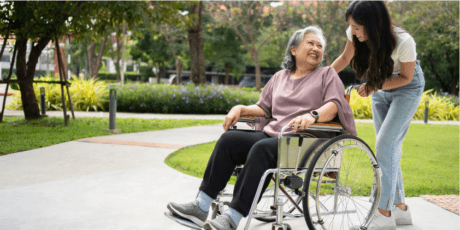
A Care Certificate is a standard in social services and a fundamental health and social care qualification. Understanding its significance and the standards it includes is important to guarantee the provision of high-quality care. What is a Care Certificate, though? Many people are still unsure about certain parts of it. But, no need to look elsewhere; our blog is here to help and cover many topics for you. This blog examines the Care Certificate, its 15 standards, and its critical role in the
What is the Care Certificate?
So, let’s ask the main question: What is a care certificate? The Care Certificate was first introduced in April 2015 due to recommendations made during the Francis Inquiry, which exposed serious shortcomings in providing care. The objectives were to raise the proficiency of carers and standardise training. Health and social care professionals can use the certificate in care, a set of standards, to gain the knowledge and skills needed to deliver safe, effective, and compassionate care. It is an essential step in guaranteeing uniform care delivery across different settings and acts as an introduction training programme for those who are new to the field.

What are the 15 standards for the Certificate in Care?
There are 15 standards of Care that list the fundamental abilities and information that carers must possess. These standards offer a thorough foundation for professional growth and training.
1. Understanding Your Role:
This section clarifies roles and responsibilities in care environments so that workers know their obligations and standards. The main goal of this standard is to ensure that workers are completely aware of their responsibilities and duties at work. It also covers relationships in the workplace and how to collaborate or operate as a team efficiently.
2. Your Personal Development:
This part promotes lifelong learning and skill improvement via professional development exercises and reflective practice. You will design a personal development plan and discover the significance of ongoing personal growth.
3. Duty of Care:
This principle stresses the significance of acting in service users’ best interests, defending their rights, and fostering their well-being. You will read about your professional responsibility of care in this section. You will also get knowledge about possible problems and how challenging circumstances might occur.
4. Equality and Diversity:
The main goals of equality and diversity are respecting and appreciating differences, advancing equality, and guaranteeing inclusive care practices. One aspect of this is lowering the possibility of discrimination at work. Additionally, you will have access to guidance and assistance about inclusion, diversion, and equity.
5. Work in a Person-Centred Way:
This approach promotes individualised treatment that honours each person’s needs, values, and preferences. It also examines ways to maintain self-esteem and reduce suffering and misery.
6. Communication:
This section emphasises the importance of excellent verbal and nonverbal communication skills in identifying and fulfilling service users’ requirements. Moreover, you will learn about the relevant laws dealing with communication and how to encourage constructive dialogue.
7. Privacy and Dignity:
This section highlights how crucial it is to protect service users’ privacy and dignity in all facets of their care. To pass this standard, you must completely comprehend privacy, take care of it, and be able to discuss it in a variety of settings.
8. Fluids and Nutrition:
This section addresses the fundamentals of nutrition and hydration, guaranteeing that service users are properly and sufficiently nourished. It will also be your responsibility to ensure that the person getting care has access to food, drink, and nutrition as per their care plan.
9. Understanding Mental Health, Dementia, and Learning Disabilities:
This section imparts information on identifying and assisting those experiencing mental health problems, dementia, or learning impairments. Positive attitudes, laws, and the definition of mental ability are among the other topics you will study.
10. Safeguarding Adults:
This part teaches how to spot and handle indicators of abuse or neglect in susceptible adults. Furthermore, you’ll discover ways to lessen the possibility of abuse and react to allegations or suspicions of abuse. There’s also a section on national and municipal laws pertaining to adult protection.
11. Safeguarding Children:
The main goal of safeguarding children is identifying and addressing issues pertaining to their safety and well-being. If you work in social care, though, you’ll be required to describe what to do if you have reason to believe a child or young person is being mistreated or neglected.
12. Basic Life Support:
teaches how to use first aid in an emergency and other vital life-saving techniques. Depending on the area of care you are working in, you will get adult, paediatric, or neonatal life support training in this section.
13. Health and Safety:
This area addresses risk assessments, health and safety laws, and fostering a secure work environment. You will learn about risk assessments, hazardous materials, fire safety, accidents, unexpected illnesses, etc.
14. Handling Information:
This section stresses the need for precise documentation, privacy, and safeguarding data. You will learn how to securely preserve current, accurate, comprehensive, and readable records. You will also discover the rationale behind the laws.
15. Infection Prevention and Control:
This section offers recommendations for preserving personal hygiene and stopping the transmission of illnesses. This means being aware of how an illness might enter the body, washing your hands properly, wearing protective gear, and handling objects safely. Additionally, it discusses personal hygiene and wellness and how they may impact the workplace.
If you want to learn more and enhance yourself with more information on 15 care standards, our School of Health Care is the best E-learning platform you should check out!

Care Certificate and the Code of Conduct
Here are the care certificate and code of conduct that the learner or anyone who wants to follow the path should know:
- Combining Professional Standards: The certificate in care complies with the England Code of Conduct for Adult Social Care and Healthcare Support Workers. Integrating these systems guarantees that carers follow professional guidelines that support moral conduct and high-quality care.
- The Value of Compliance: Adherence to the Code of Conduct and the treatment Certificate requirements is essential to preserve public confidence and provide consistent treatment. It emphasises how dedicated carers are to maintaining the greatest standards in their line of work.
How to get Certificate in Care?
Qualifiability Standards:
The Care Certificate is usually mandatory for all newly hired healthcare assistants and social care support professionals who are new to the field. Current employees can also benefit from it as part of their continuing professional development.
Process of Training and Assessment:
Completing training covering all 15 criteria requires obtaining the Care Certificate. This training frequently combines in-person instruction, online learning, and hands-on evaluations. The evaluation process for candidates includes in-person interviews, written tasks, and reflection reports. But, if you are looking for the best place to get started or complete a Care certificate course, then our School of Health Care is the best e-learning platform that you can find.
Schedule and Expenses:
The Care Certificate usually takes a few weeks to several months to complete, depending on the learner’s speed and the training provider. The cost also varies, with some businesses paying for the course as part of their staff development initiative. But we at the School of Health Care can cover that. At our school of health care, you can get this course at the best price and a lower price than other platforms. The School of Health Care thinks about the learner before anything. So, we are there for you to help you 24/7. Hence, we are the only E-learning Platform to offer not only a lower price but also to help 24/7.
Conclusion
To summarise, the Care Certificate is a crucial first step in guaranteeing that carers have the abilities and information required to deliver high-quality care. Both new and experienced care workers must comprehend its criteria, how they fit into professional behaviour, and how to get the certificate. This dedication to standardised training improves care quality in the social and healthcare sectors.
FAQ
Qs 1. Is the Care Certificate compulsory?
While not legally mandatory, it is highly recommended for new care workers and often required by employers.
QS 2. Can existing staff benefit from the Care Certificate?
Yes, it is a valuable tool for ongoing professional development and skill enhancement.
Qs 3. How long does it take to complete the Care Certificate Course?
The duration varies but typically takes between a few weeks to several months.
QS 4. Who provides the training for the Care?
Training is provided by employers, training organisations, and online platforms.
Qs 5. What happens if a care worker does not have the Care Certificate?
Without the certificate, care workers may face limited employment opportunities and may not meet employer requirements for competence in care delivery.

0 responses on "What is the Care Certificate? 15 standards of care that you should know"